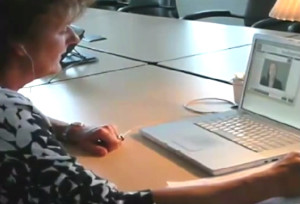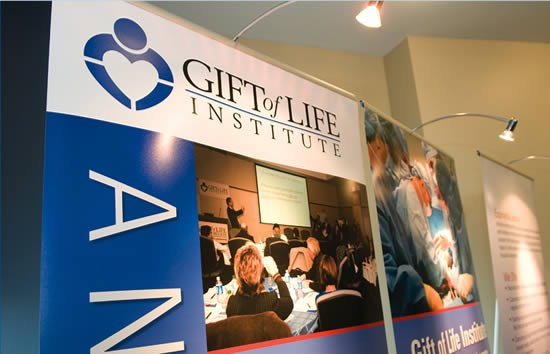Providing Effective Feedback to OPO Professionals
Effective employee skills feedback can have profound effects. All staff in the potential role of “coach” to donation professionals should embrace this opportunity for powerful individual employee and organizational growth.
The field of organ and tissue donation is one of high stakes. In other industries, performance improvement might equate with more units manufactured and sold, more money made, or stock price increases. In ours, it means more human lives saved.
Providing effective feedback to OPO employees on job skills is a critical route to performance improvement. Giving feedback constructively can drive organizational performance in the grand scheme by affecting employee performance at the individual level.
Coaching
Employee skills coaching can take many forms. What is possible through coaching depends on many factors, such as the coach-trainee relationship. For instance, what is possible within an established manager-employee scenario may not be feasible within an online skills coaching scenario and vice versa.  In Gift of Life Institute’s WebEncounter training platform (an online application in which participants can role-play according to specific scenarios), the trainer has the advantage of a sometimes healthy separation that is unaffected by “office politics” or the reticence that can accompany mock role-play work and critique between established colleagues. However, this scenario is constrained by limitations in depth of knowledge about the learner’s background, career goals and so forth. The manager and employee scenario has the advantage of breadth of knowledge and observational time with the trainee, yet may be constrained by other factors such as routines, schedules, and ingrained ways of relating in an established relationship. Regardless of limitations and advantages imposed by the specifics of the relationship, giving feedback effectively is an invaluable business asset.
In Gift of Life Institute’s WebEncounter training platform (an online application in which participants can role-play according to specific scenarios), the trainer has the advantage of a sometimes healthy separation that is unaffected by “office politics” or the reticence that can accompany mock role-play work and critique between established colleagues. However, this scenario is constrained by limitations in depth of knowledge about the learner’s background, career goals and so forth. The manager and employee scenario has the advantage of breadth of knowledge and observational time with the trainee, yet may be constrained by other factors such as routines, schedules, and ingrained ways of relating in an established relationship. Regardless of limitations and advantages imposed by the specifics of the relationship, giving feedback effectively is an invaluable business asset.
Feedback
 Despite its potential, the word “feedback” can send shivers up an employee’s spine which, in turn, may limit the coach’s inclination or ability to effectively use this critical tool. Furthermore, organizational culture often dictates feedback philosophy. For instance, if feedback is seen being delivered up and down the OPO hierarchy as a means of overall organizational improvement, it is more readily accepted than if it’s being used as a non-productive critical element (i.e., a weapon).
Despite its potential, the word “feedback” can send shivers up an employee’s spine which, in turn, may limit the coach’s inclination or ability to effectively use this critical tool. Furthermore, organizational culture often dictates feedback philosophy. For instance, if feedback is seen being delivered up and down the OPO hierarchy as a means of overall organizational improvement, it is more readily accepted than if it’s being used as a non-productive critical element (i.e., a weapon).
The Ken Blanchard Companies report that the three primary reasons people resist giving feedback are:
- They’re fearful the other person will get angry;
- They’ve tried before and didn’t get results;
- They’re not sure how to do it effectively.
Fortunately, giving feedback effectively is a skill that can be learned:
- It is important to approach an employee feedback situation from a basis of respect.
- Do your pre-work. Gain as much insight into the employee as possible (e.g., background, professional strengths and opportunities, passions). The extent to which this is possible varies considerably based on the type of coaching situation, but is often possible to some extent with just a bit of effort and time.
- Convey your own belief about how opportunities for growth translate into improved job performance and outcomes. Strive to attach the potential growth experience to something meaningful for the specific employee and overall OPO performance.
Managers sometimes fail to see learning and career development as an important aspect of their roles which, in turn, can limit their drive to master the delivery of effective feedback. But what can come from good feedback is actually pretty exciting. Current weaknesses or gaps ARE near-future opportunities! This means more lives can be saved, more families can feel their loved one live on, and more people can leave an extended legacy. It’s important for each manager to channel their inner coach and know that growth in an area that is personally meaningful to the employee can also be an incredibly rewarding professional experience.
Know Your Environment
The organ and tissue donation work environment is unique. It is often filled with long hours and colored by heightened emotions and the knowledge of how important outcomes are to the lives of so many. Providing feedback and coaching in these circumstances requires special attention to timing, delivery, and the employee’s state of mind. Being mindful of states of physical or emotional exhaustion is important so that timing of communication can be adjusted accordingly for both employee compassion and feedback efficacy. It’s also important to regularly recognize that most professionals in the OPO field are passionate about their work and serious about their performance. Knowing that this means that staff may be their own greatest critics can remind those providing feedback to approach the employee with respect and the feedback as a valuable, important opportunity.
The “A-ha Moment”
 When coaching an OPO professional on a job skill or mindset, strive for that meaningful moment when everything comes together and creates a lasting change for the employee. Executive coach Kathleen Martin advises on getting an employee to that “A-ha moment”:
When coaching an OPO professional on a job skill or mindset, strive for that meaningful moment when everything comes together and creates a lasting change for the employee. Executive coach Kathleen Martin advises on getting an employee to that “A-ha moment”:
- Resist the urge to push but, rather, recognize how important timing is to the learning of a new skill or perception.
- Utilize pauses and silences rather than fight to avoid them. Yet know when to nudge. By paying close attention to the employee you may notice when they are holding back but are ready to move with some assistance.
- Notice energy level changes. There can be a discernible shift after an “A-ha moment” that paves the way to move on.
- Celebrate success. This can be as simple as allowing a few moments to allow the shift in realization to sink in.
- Solidify the learning by establishing an action plan. Summarize the learning that has occurred, establish a plan for the employee to put the skills into action, and set a realistic plan for follow-up.
Effective employee skills feedback can have profound effects. All staff in the potential role of “coach” to donation professionals should embrace this opportunity for powerful individual employee and organizational growth.
References:
http://www.kenblanchard.com/Leading-Research/Research/Take-the-Fear-Out-of-Feedback
https://leaderchat.org/2016/03/22/5-tips-for-coaching-to-the-aha-moment/
Elizabeth Spencer has been working in the OPO community since 2002. She was with Washington Regional Transplant Community (WRTC) for nine years, serving as both Director of Hospital Services & Professional Education, and in the clinical division as a Senior Clinical Recovery Coordinator. As Director of Hospital Services & Professional Education, Elizabeth was responsible for oversight of partnerships with area hospitals regarding the implementation of donation best practices, donation educational programs for various hospital staff, hospital data analysis and reporting, hospital donation strategic planning, and hospital policies related to organ and tissue donation.

